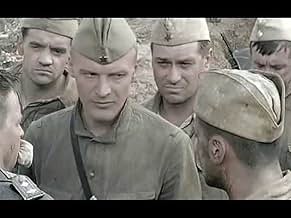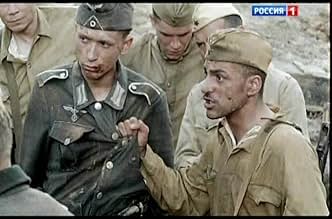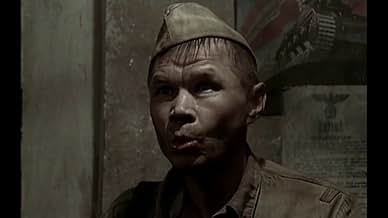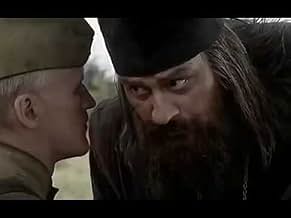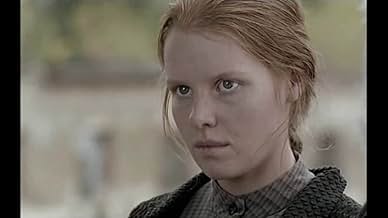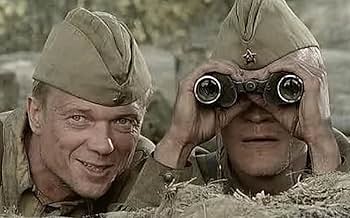Shtrafbat
- Série télévisée
- 2004
- 9h 10min
NOTE IMDb
7,3/10
1,6 k
MA NOTE
Ajouter une intrigue dans votre langueDrama of the penalty parts of political prisoners, who fought on the Soviet fronts.Drama of the penalty parts of political prisoners, who fought on the Soviet fronts.Drama of the penalty parts of political prisoners, who fought on the Soviet fronts.
- Récompenses
- 2 nominations au total
Parcourir les épisodes
Avis à la une
Shtrafbat is the story of a Soviet penal battalion at the height of the Second World War. The film follows the characters from the formation of the battalion in the prison yard to its complete decimation in combat against the Germans.
The film is a good introduction to the complexities of the Soviet war effort, covering the various motivations the characters have for signing up and the callous attitude of the military towards these people as well as giving a good idea of what an absolute hell the Eastern Front was.
The premise and the acting are generally good, but the story seems to move along in fits due to a mediocre directorial effort on the part of Dostal'. Perhaps he was unfamiliar with the mini-series format or just short on time, I don't know, but on the whole the film seems rather artificial and constructed. Segue contrast with "Seventeen Moments of Spring" and "Shield and Sword". Oh Well.
Shtrafbat could have been a whole lot better. Certainly. It is nonetheless worth watching for the history and (if for nothing else) the excellent final scene.
The film is a good introduction to the complexities of the Soviet war effort, covering the various motivations the characters have for signing up and the callous attitude of the military towards these people as well as giving a good idea of what an absolute hell the Eastern Front was.
The premise and the acting are generally good, but the story seems to move along in fits due to a mediocre directorial effort on the part of Dostal'. Perhaps he was unfamiliar with the mini-series format or just short on time, I don't know, but on the whole the film seems rather artificial and constructed. Segue contrast with "Seventeen Moments of Spring" and "Shield and Sword". Oh Well.
Shtrafbat could have been a whole lot better. Certainly. It is nonetheless worth watching for the history and (if for nothing else) the excellent final scene.
Just saw two episodes. Such a refreshing view, despite the grim subject, to see actors playing the story and not their narcissism. Perhaps it's the script but I don't know. These actors are great. The absence of big bucks is funny sometimes, battle scene in minefield, but then artistic. I haven't watched Band of Brothers end to end. Hear it is very good. But to see real passion and not sentimentality, argument and not posing, the glimpses of the women are amazing, the clarity of the narrative, the steady invention with the camera without being arty, and the absence of gratuitous gore. All left to the actors and story. Anyway, just a joy.
"The Penal Battalion" - the harsh military series of Nikolay Dostal. The film opens to the viewer unknown pages from the history of the Second World War. Few of us knew what terrible victims the victory of the Red Army over the Nazis was achieved, what a significant role in this victory played fines, prisoners of Soviet prisons, including the Gulag. The brilliant main role of Aleksey Serebryakov.
Shtrafbat is the story only Russians could tell about the Second World War. The largest front of the whole conflict has been, ironically, the least appearing subject on the silver screen after the war. While the Western Allies war-effort has been pictured in almost every possible detail and manner, the East has been left out or the job has been left to only some old propaganda movies of little else than historical footage value.
There is no chance that Shtrafbat could compete with Band of Brothers in every detail but neither you want to look at the screen with examining petty visual effects in mind. That the soldiers are Russians is enough big reason to forgive the less eye-captivating battle scenes and you can concentrate on the story that is the most interesting. So much different was the war in the Eastern front, and the nature of the Russian army, that you might wish people to produce more dramatizations from the other fronts, and of armies.
Shtrafbat is no way perfect, but it has some rare specialties that augment the overall rating. It tends to crush myths people have about the Second World War, the true heroes were Russian people and not their leaders who sent them to missions where they could only perish. Another great myth bust is that it presents the enemy, who does not pick up his gun, as an equal human being - an advancement that has been difficult to try in many acclaimed films as well. Shtrafbat shows how the war in the eastern front was a war of survival and how the clash of the -isms grinds people into dust.
There is no chance that Shtrafbat could compete with Band of Brothers in every detail but neither you want to look at the screen with examining petty visual effects in mind. That the soldiers are Russians is enough big reason to forgive the less eye-captivating battle scenes and you can concentrate on the story that is the most interesting. So much different was the war in the Eastern front, and the nature of the Russian army, that you might wish people to produce more dramatizations from the other fronts, and of armies.
Shtrafbat is no way perfect, but it has some rare specialties that augment the overall rating. It tends to crush myths people have about the Second World War, the true heroes were Russian people and not their leaders who sent them to missions where they could only perish. Another great myth bust is that it presents the enemy, who does not pick up his gun, as an equal human being - an advancement that has been difficult to try in many acclaimed films as well. Shtrafbat shows how the war in the eastern front was a war of survival and how the clash of the -isms grinds people into dust.
"Shtrafbat" (2004), an 11-part TV series, is about Soviet Army battalions made up of many kinds of prisoners, hoping to be "rehabilitated" of their "crimes".
"Shtrafbat" (Punishment or Penal Battalions) were made up of deserters, political prisoners, and former POWs who had returned from German captivity (according to Stalin: allowing ones-self to be captured alive & imprisoned was akin to surrendering, & surrendering was considered to be treason, a crime punishable by death), and even "regular" criminals sent from prison-camps, so the suspicion that these people wouldn't fight well, or might even surrender, was high. These "criminals" were "graciously" allowed "a second chance" by the government, a chance to "wash away their past sins with their own blood."
These "Shtrafbat" were sent on the most dangerous and difficult missions (i.e. those with low survivability) and were followed into battle by troops who were called "Zagrad-Otryad" (Blocking Troops), and were under NKVD (precursor to the KGB) control. Sometimes these troops were almost as large as the actually fighting units they blocked. They were under orders to shoot any Soviet soldiers who were thought to be retreating, be they wounded or not.
The few "Shtrafbat" soldiers who lived through it for some months, were considered rehabilitated and returned to regular army units. The KIAs were rehabilitated posthumously, sparing their families from being branded as families of traitors, "enemies of the Soviet people."
"Shtrafbat" (Punishment or Penal Battalions) were made up of deserters, political prisoners, and former POWs who had returned from German captivity (according to Stalin: allowing ones-self to be captured alive & imprisoned was akin to surrendering, & surrendering was considered to be treason, a crime punishable by death), and even "regular" criminals sent from prison-camps, so the suspicion that these people wouldn't fight well, or might even surrender, was high. These "criminals" were "graciously" allowed "a second chance" by the government, a chance to "wash away their past sins with their own blood."
These "Shtrafbat" were sent on the most dangerous and difficult missions (i.e. those with low survivability) and were followed into battle by troops who were called "Zagrad-Otryad" (Blocking Troops), and were under NKVD (precursor to the KGB) control. Sometimes these troops were almost as large as the actually fighting units they blocked. They were under orders to shoot any Soviet soldiers who were thought to be retreating, be they wounded or not.
The few "Shtrafbat" soldiers who lived through it for some months, were considered rehabilitated and returned to regular army units. The KIAs were rehabilitated posthumously, sparing their families from being branded as families of traitors, "enemies of the Soviet people."
Le saviez-vous
- ConnexionsReferenced in Comedy Club: Épisode #1.13 (2005)
Meilleurs choix
Connectez-vous pour évaluer et suivre la liste de favoris afin de recevoir des recommandations personnalisées
Détails
- Durée
- 9h 10min(550 min)
- Couleur
Contribuer à cette page
Suggérer une modification ou ajouter du contenu manquant

